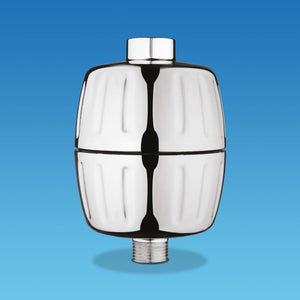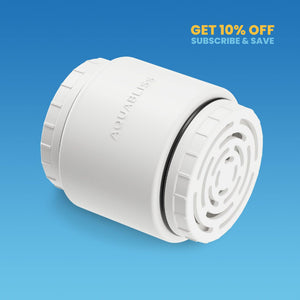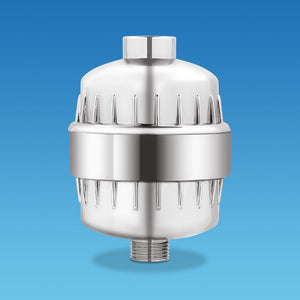Bathing and personal hygiene are essential parts of our daily routine, but many of us overlook the impact that the quality of our water has on our hair health. One of the most common culprits behind hair issues is hard water.
If you’ve noticed changes in your hair texture, increased frizz, or even hair loss, hard water might be the cause. But how exactly does hard water damage your hair, and what can you do to fix it?
This guide will walk you through how to reduce the effects of hard water on hair and restore it to its natural shine and health. Let’s dive in!
1. What Are the Signs of Hard Water Damage on Hair?

Recognizing the signs of hard water damage is the first step toward fixing the problem. The minerals in hard water—primarily calcium and magnesium—create mineral buildup on your scalp and hair, leading to various hair issues.
These dissolved minerals don’t just affect the outer surface of the hair; they interfere with your scalp’s health, clogging pores and weakening hair follicles over time.
Here are some telltale signs of hard water hair damage:
- Dry hair that feels brittle and lacks moisture.
- Increased hair breakage, leading to noticeable thinning and hair fall.
- Dull hair that’s lost its natural shine and smoothness.
- Split ends and frequent tangles are difficult to manage.
- Persistent scalp issues, such as itchiness, irritation, or dandruff, are due to the buildup of minerals.
- Difficulty lathering shampoo indicates that the minerals are preventing your products from working effectively.
These negative effects are primarily caused by high concentrations of calcium and magnesium, which prevent your hair from absorbing the necessary nutrients. Over time, this leads to hair thinning, frizz, and even hair loss. Fortunately, there are effective solutions to help protect and restore your hair health.
2. How Can You Adjust Your Hair Care Routine for Hard Water?
Once you've identified the damage, it's time to adjust your hair care routine. Start by incorporating products that help neutralize the effects of hard water and prevent further damage.
-
Clarifying shampoos: One of the first steps in reducing the effects of hard water on hair is using a clarifying shampoo. These shampoos are designed to remove mineral buildup, helping restore your hair’s softness and shine. Look for chelating shampoos, which contain special agents that bind to hard water minerals, washing them away. This type of shampoo is more effective than regular shampoos for breaking down calcium and magnesium buildup.
-
Natural hair treatments: Consider using natural treatments to help combat the effects of hard water. For example, an apple cider vinegar rinse can help break down mineral buildup and restore your hair’s pH balance. Similarly, lemon juice can be used as a natural rinse to reduce mineral buildup and give your hair a fresh, clean feel.
-
Nourishing hair masks: To repair the damage caused by hard water, using a nourishing hair mask once a week is essential. Ingredients like argan oil, coconut oil, or shea butter are known for their restorative properties and can help replenish lost moisture and nutrients. These masks not only help to smooth out the hair cuticles but also provide long-lasting hydration to keep your hair healthy and shiny.
-
Leave-in conditioner: Using a leave-in conditioner after every wash can be beneficial for reducing hair breakage. A leave-in treatment adds an extra layer of protection to your hair by sealing in moisture and providing a barrier against environmental factors and hard water minerals.
-
Pre-shampoo treatments: Incorporate pre-shampoo treatments into your routine. Products like nourishing oils or even natural oils such as jojoba or argan oil can help reduce the impact of hard water. These oils act as a protective coating, shielding your hair from the harsh effects of hard water minerals.
By focusing on products designed to address hard water damage, you’ll significantly improve your hair’s texture, moisture retention, and overall health.
3. Install a Shower Filter to Protect Your Hair from Hard Water
While adjusting your hair care routine is important, tackling the root of the problem is equally essential. One of the most effective ways to prevent hard water from damaging your hair is by installing a shower filter.
Shower filters work by removing harmful minerals such as calcium and magnesium from your water, preventing mineral buildup on your scalp and hair.
These filters often contain multiple layers of filtration media, including activated carbon and ion exchange resins, which reduce heavy metals and chemicals like chlorine in addition to hard water minerals.
The result? Softer water that’s gentler on your hair and skin. Installing a shower filter can lead to immediate improvements in how your hair feels after a wash. Instead of feeling stiff or weighed down by mineral buildup, your hair will retain its natural softness and become easier to manage.
At AquaBliss, we offer a range of shower filters that specifically target hard water minerals and improve hair health. Our AquaBliss Revitalizing Shower Filter (SF100) reduces minerals, chlorine, and heavy metals, providing cleaner, softer water for every wash.
Using filtered water from our shower heads can help maintain healthy hair by minimizing hair damage caused by hard water.
4. Consider Installing a Water Softener for Whole-Home Protection

While shower filters are a great solution for protecting your hair, you might want to consider a more permanent solution: installing a water softener for your entire home.
Water softeners use a process called ion exchange, which removes calcium and magnesium from the water supply and replaces them with sodium or potassium ions. This effectively converts hard water into soft water, which is much gentler on your hair, skin, and even your home’s plumbing system.
Switching to soft water has numerous benefits for your hair. Without the presence of damaging minerals, your hair can absorb moisture more easily, which helps reduce hair fall, improve overall hair texture, and prevent future hair damage.
It can also make your hair products—like shampoos and conditioners—work more effectively, as they won’t be hindered by mineral buildup.
A water softener will not only protect your hair but will also benefit your entire household by preventing scale buildup in pipes and appliances, extending their lifespan.
5. Incorporate Healthy Hair Practices into Your Routine
In addition to using the right products and filtering your water, adopting a few healthy hair practices can help mitigate the effects of hard water.
-
Cold water rinses: After washing your hair, finish with a rinse of cold water. Cold water helps to seal the hair cuticles, preventing minerals from being absorbed and locking in moisture. This simple step can make a noticeable difference in how your hair looks and feels.
-
Use filtered or bottled water: If you're traveling or staying in an area with hard water, consider rinsing your hair with filtered or bottled water. This can help minimize exposure to hard water minerals when a shower filter isn’t available.
-
Avoid over-washing: Washing your hair too frequently with hard water can exacerbate hair issues. Try to limit hair washing to 2-3 times a week, and always use a leave-in conditioner or hair serum afterward to protect your hair.
-
Use a shower cap: If you aren’t washing your hair every day but still shower daily, consider wearing a shower cap to protect your hair from hard water exposure.
6. Look After Your Internal Health
While it’s important to focus on external solutions for hair care, your internal health also plays a key role in maintaining healthy hair. Ensure you’re getting enough vitamin D and other essential nutrients through your diet, as deficiencies in certain vitamins can make your hair more susceptible to damage.
Drinking plenty of water, especially filtered water, can also improve the health of your scalp and hair by keeping it hydrated from the inside out.
Conclusion: Protect Your Hair from Hard Water Damage Today
Don’t let hard water continue to damage your hair. By taking proactive steps—such as adjusting your hair care routine, installing a shower filter, or investing in a water softener—you can significantly reduce the negative effects of hard water on your hair.
At AquaBliss, we’re committed to helping you achieve healthy hair by providing high-quality shower filters that remove damaging minerals from your water supply. Try our AquaBliss Revitalizing Shower Filter or explore other options designed to protect your hair and skin from the harmful effects of hard water.
Shop AquaBliss filters today and start your journey toward softer water and healthier hair.







